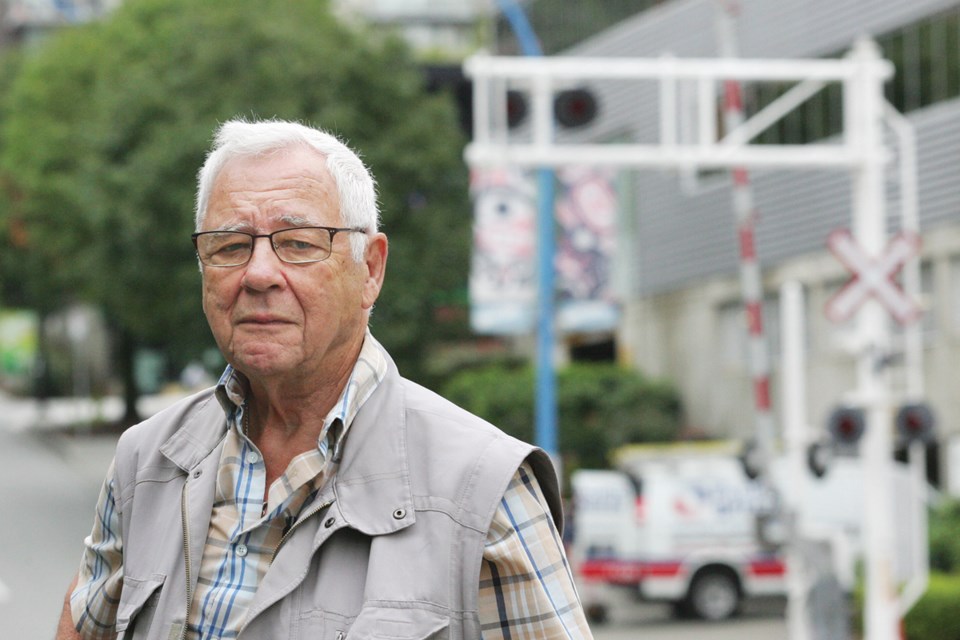TRAINS passing through North Vancouver are giving some residents an unwanted earful.
Resident Per Christensen said train whistles have become an ongoing problem on the North Shore, particularly in the Lower Lonsdale area.
"I think it has gotten worse," he said. "Initially when I moved in I didn't have a problem, maybe that's because they were less frequent or maybe the whistles weren't as bad."
Christensen said he is not the only one affected by the noise. A number of North Vancouver residents have been sharing their own frustrations on the Residents Against Noisy Trains blog; with one resident stating they experienced one full hour of intermittent whistling.
Brad McRae, manager of bylaw services with the City of North Vancouver, said the whistles are part of federal legislation.
"It's a requirement for certain types of railway crossings we currently have," said McRae. "The Low Level Road project, from the last design that I saw, was to eliminate a couple of those at-grade crossings to make them controlled crossings and that negates the train from actually having to use the whistle."
McRae said the legislation states that if it's an uncontrolled crossing, the train has to whistle two short, one long, and one short, and can also be used under the discretion of the operator.
"The train operator, if there's anything impeding the track, any safety issue, any person on the tracks, they can use their whistle as needed to remedy the situation," said McRae. "The Low Level Road project itself is being designed with some mitigation strategies in it, so that should alleviate not only some of the train whistling noise but also some of the actual train travelling noise, shunting noise, etcetera."
Christensen said he understands the whistles are federally regulated and that making changes might be difficult, but hopes something can be done.
"I think the one thing that we feel, that one would hope that they could change, would be the type of whistling that they do," he said. "Some of these whistles are really, really prolonged, they start early and they go, it seems a lot more than others in terms of numbers and times. The intensity of them can be pretty dramatic if they prolong them."
According to Transport Canada, a train operating at more than 70 kilometres per hour must sound the whistle approximately half a kilometre before the crossing, "to be prolonged or repeated, until the crossing is fully occupied." If a train is travelling less than 70 km/h, the whistle is sounded "20 seconds before entering the crossing and continuing to sound whistle signal until crossing is fully occupied."
The District of North Vancouver has also heard from residents who are unhappy with train whistles.
"The district does receive complaints from residents, usually involving nighttime whistling activities," said Stephanie Smiley, district spokeswoman. Smiley said they are trying to remedy the situation by "implementing noisereduction strategies," such as installing sound barriers.
John Weston, MP for West Vancouver-Sunshine Coast-Sea to Sky country, camped out in the Norgate area for three hours on Sunday Sept. 1 to listen to the noise from the CN trains that was keeping residents awake at night.
"I had been willing to stay the whole night but we basically experienced the full spectrum of the sounds and noises that the constituents wanted me to hear," said Weston. "I thought it was a great example of constituents taking control over, or trying to take control over an issue that is relevant to them. If you can get all the people involved in a discussion who are relevant to the decision, then you are more likely to get effective results."
But for neighbouring District of West Vancouver, train noise is not a problem. The Sounding of Train Whistles Prohibition Bylaw, enacted in 1958, prevents any train whistle or bell from being used at any crossing within the municipality.
Raymond Fung, director of engineering and transportation for the district, said the bylaw was put in place to deal with the nuisance of loud whistles throughout the day and night.
"My understanding is that the rail companies are not willing to enter into these types of arrangements anymore," said Fung.
"That's why the district has sort of been grandfathered into this situation."
Christensen said he would just like to see some resolution to the problem.
"These long whistles that they have can be extremely annoying, particularly at night and early morning hours," said Christensen. "I would hope that they would try and work on that. It's been going on for a lot of years and the complaints have been ongoing and virtually the same, nothing has changed there."
According to Transport Canada, municipalities could eliminate whistling at public crossings by discussing the matter with the rail company. If both parties agree, a Transport Canada railway safety inspector would determine whether the crossing meets certain criteria, such as whether the crossing has flashing lights and bells.
The City of North Vancouver currently has plans in place to apply for the elimination of whistling at various crossings, though the application process could take several months, according to Connie Rabold, city communications manager.



